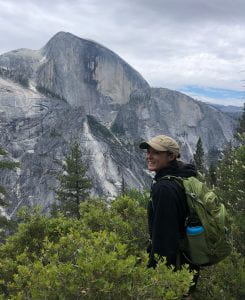PhD Student
Department of Earth and Planetary Sciences
gpearsal@ucsc.edu
Research interests: wetland biogeochemistry, data science, carbon cycle
Biography
I grew up in the mountains of western North Carolina and attended the University of North Carolina at Chapel Hill – where I received a B.S. in Geology and in Environmental Science. When I started college I was set on studying climate policy, but after taking an introductory geology class I realized my interest in climate policy really stemmed from a curiosity about the Earth science that informs policy decisions. I discovered my enthusiasm for biogeochemistry while working on an undergraduate research project focused on Miocene bay scallop ecology. After graduating, I completed a field season with the USFS in Nevada and worked in science communication at Radiant Earth Foundation. I joined the Paytan lab in the fall of 2020 as a PhD student in the Earth and Planetary Sciences Department.
Research
Often a patchwork of vegetation and open water, coastal wetlands exhibit strong biogeochemical heterogeneity, which results in elevated methane flux at certain times and in certain locations. These points of elevated methane flux, termed “hot spots and hot moments”, experience biogeochemical rates so high they can disproportionally contribute to annual flux rates, but have been notably absent when estimating and modeling the C balance of coastal wetlands. I plan to approach methane flux through an ‘Ecosystem Control Points’ framework that centers the role of hot spots and hot moments and develop an upscaled, predictive model capable of forecasting FCH4 under future climate or land-use scenarios. To that end, I will interrogate high-resolution atmospheric and environmental data collected by a network of eddy covariance towers stationed in coastal wetlands across the US to identify key predictors of heightened methane flux, build a scale-aware predictive model, and provide a better understanding of the net C sequestration potential of coastal wetlands. I am also very interested in science communication, big data applications in the geosciences, and increasing accessibility to Earth Science.
